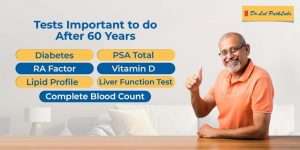Diet and Lifestyle Changes to Reduce Prostate Cancer Risk

Prostate cancer is one of the most common cancers affecting men worldwide. However, adopting a healthy diet and making positive lifestyle changes can significantly reduce its risk. Eating nutrient-rich foods, staying active, and maintaining a healthy weight can help support prostate health and reduce the risk of cancer.
This article explores dietary tips and essential lifestyle changes to reduce prostate cancer risk and lead a healthier life.
What is Prostate Cancer?
Prostate cancer is a cancer that develops in the prostate, a small, walnut-sized gland in men that produces seminal fluid, which nourishes and transports sperm. It is one of the most common cancers in men, particularly those over the age of 50.
This condition typically develops slowly and may not present noticeable symptoms in its early stages. However, in certain cases, prostate cancer can be more aggressive and spread to other areas of the body. Symptoms of prostate cancer often include difficulty urinating, frequent urination at night, blood in the urine, or pain in the pelvic area.
How to Reduce Risk of Prostate Cancer
1. Consume an Anti-Inflammatory Diet
Inflammation can lead to the development of various cancers, including prostate cancer. Consuming anti-inflammatory foods such as nuts, leafy greens, fatty fish high in omega-3 fatty acids, and olive oil can minimise the risk of developing this condition. Spices like turmeric and ginger also possess anti-inflammatory properties, making them a healthy addition to the diet for prostate cancer prevention.
2. Reduce Fat Intake
High-fat diets increase the risk of developing prostate cancer. Therefore, limiting the consumption of red and processed meats, fried foods, and packaged snacks is essential. Men should also replace unhealthy fats with healthier alternatives like avocados, nuts, seeds, and olive oil. Other effective ways to reduce fat from the diet are consuming leaner cuts of meat, using less fat in cooking, avoiding trans and saturated fats, etc.
3. Eat More Fruits and Vegetables
Fresh fruits and vegetables are abundant in antioxidants, vitamins, and minerals that help fight cancer-causing elements. Consume more portions of fruits and vegetables, such as broccoli, cauliflower, tomatoes, and watermelons. A simple way to eat more fruits and vegetables is to add an extra serving to each meal or eat them for snacks.
4. Reduce Dairy Consumption
Some studies suggest that excessive consumption of dairy products can increase prostate cancer risk. Instead, choose plant-based alternatives like almond or oat milk and focus on other calcium-rich foods like leafy greens.
5. Exercise Regularly
Regular physical activity helps maintain hormonal balance, boosts the immune system, and prevents obesity. Studies have also shown that men who exercise regularly have a lower prostate cancer risk than men who don’t. Therefore, try to get at least 30 minutes of moderate exercise daily, such as brisk walking, cycling, or swimming.
6. Maintain a Healthy Weight
Individuals who have a body mass index of over 30 are considered obese. Being overweight can not only lead to severe health conditions but also significantly increase the risk of prostate cancer. Therefore, it’s important to maintain a healthy weight through a balanced diet and consistent exercise.
7. Avoid Smoking
Smoking not only increases the risk of prostate cancer but can also aggravate it. Research suggests that individuals with prostate cancer who smoke face an increased risk of the cancer coming back. Additionally, they have a greater likelihood of the disease spreading beyond the prostate. Quitting smoking can lower inflammation, improve lung and heart health, and reduce the risk of advanced prostate cancer.
8. Manage Stress
Chronic stress can impact overall health and weaken the immune system, leading to the development of cancer cells. To enhance mental well-being and lead a healthier life, incorporate stress-relief activities such as meditation, yoga, deep breathing exercises, etc.
9. Get a Prostate Cancer Screening
Men aged 45 and older should consult their doctor about prostate cancer screening to understand potential risks. It typically involves a PSA (Prostate-Specific Antigen) blood test, which measures PSA levels. If one experiences symptoms, it’s advisable to start prostate cancer treatment as early as possible.
10. Avoid Over-Supplementation
While supplements can support overall health, over-supplementation can do more harm than good. Instead, focus on obtaining nutrients from a balanced diet rich in fruits, green leafy vegetables, whole grains, and lean proteins.
Incorporating healthy lifestyle choices and a balanced diet can lower the risk of prostate cancer. But if one experiences any symptoms, it’s advisable to immediately consult a healthcare professional and book a prostate cancer test with Dr Lal PathLabs.
FAQs
1. What are the best foods to reduce prostate cancer?
To reduce prostate cancer risk, men must consume cruciferous vegetables like cauliflower, broccoli, and kale along with fresh fruits, fatty fish, and nuts.
2. How to reduce PSA levels?
One can reduce PSA levels by consuming a healthy diet, maintaining a healthy weight, exercising regularly, and avoiding alcohol and smoking.













